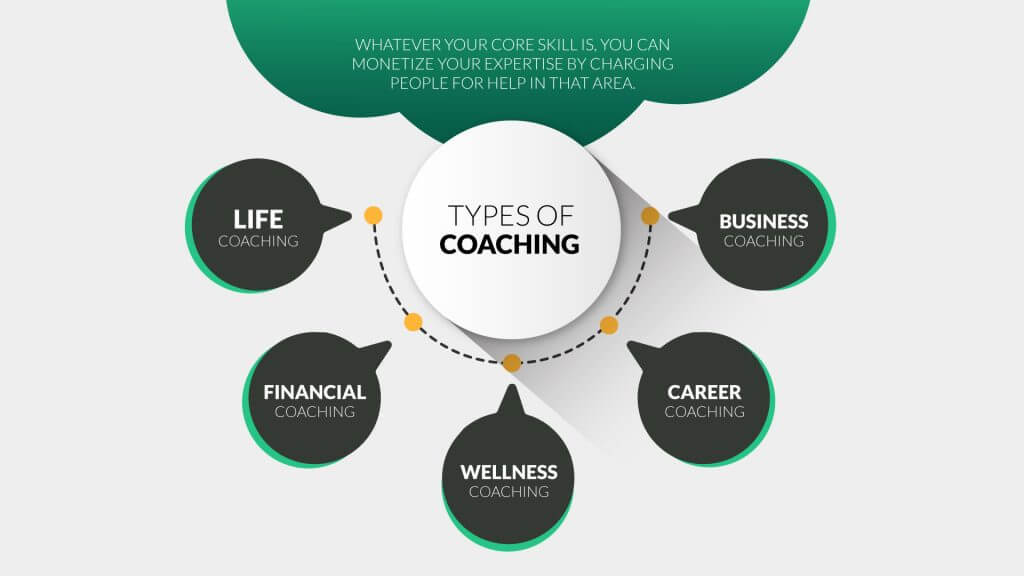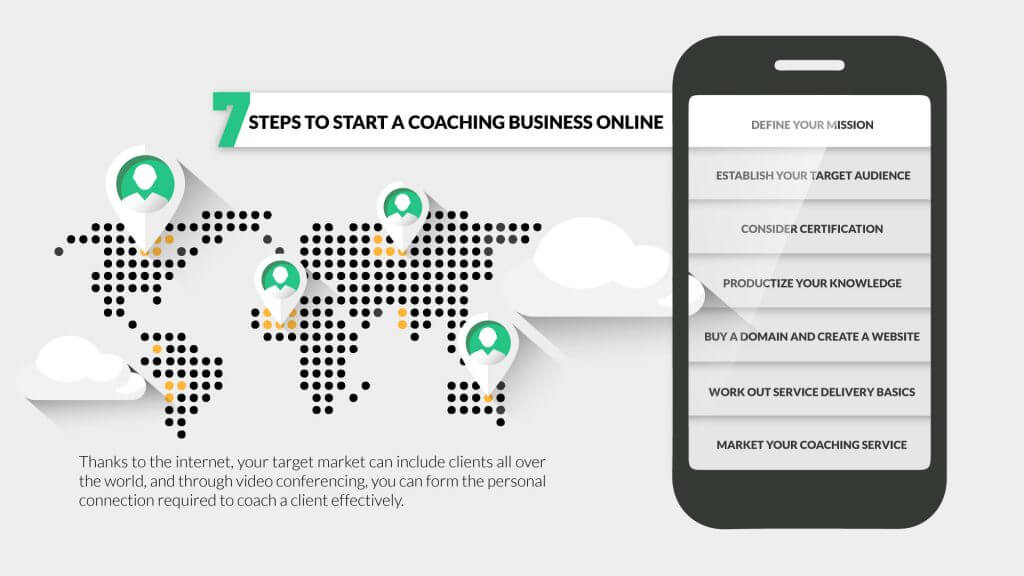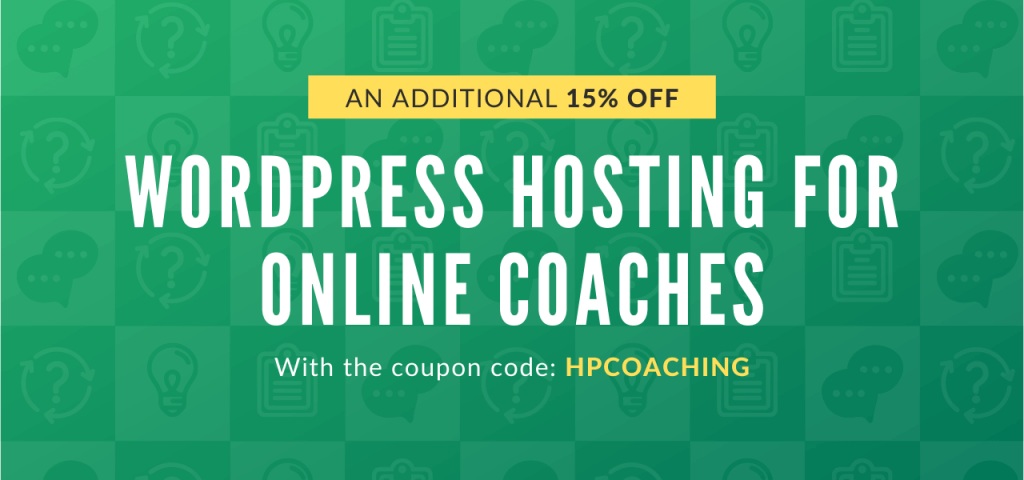Online coaching can be a rewarding career for anyone who enjoys helping people. The ability to provide coaching service over the Internet makes it a business that you can start with a small monetary investment. The required time investment is another story.
The process of creating an online coaching business calls upon you to carefully assess your niche, refresh your knowledge, precisely identify potential customers, and more. There’s a lot of ramp-up time.
In this comprehensive guide on how to start a coaching business, we’ll define online coaching, discuss its benefits, cover the types of coaching you could provide, and lay out a seven-step process to start a coaching business online.
What Is an Online Coach?
An online coach guides a client toward their desired goal, providing objectivity, enthusiastic support, and actionable advice. This service is monetized and delivered via the Internet.
Technology has made coaching a viable career option for people who want to run a home-based business. Thanks to the Internet, your target market can include clients all over the world, and through video conferencing, you can form the personal connection required to coach a client effectively.
How to Start a Coaching Business, Step Zero: Become a Coach
As we go through life, we gain experience in many areas. Core competencies emerge. To become an online coach, you must explore your core competencies. Assess the areas of expertise that make you uniquely qualified to help others and then practice sharing those skills.
What do you do better than everyone you know? Is it saving money, staying fit, or parenting? Are you an expert in management or other business-related topics? Can you help people achieve their career goals?
Whatever your core skill is, you can monetize your expertise by charging people for help in that area. The general idea is to offer expert advice and guidance via video conferencing and do so in a structured way that’s easy to monetize.
You shouldn’t share all your knowledge at once; instead, offer a program that dispenses your coaching advice slowly. Ideally, this approach will not only match the rate at which the client should proceed, but it will also spread the service offering over an extended period of time.
Let’s look at the different coaching niches that have become most popular and then get into the steps required to start an online coaching business.
Types of Coaching
You could select any niche for your coaching business. If you have the required experience and the ability to share it, you can be successful in helping people achieve their goals.
Some of the most common and profitable coaching niches are described below.

- Life Coaching—A life coach’s client may wish to become more confident, improve their coping skills, or better control their anger. They may need help facing any of life’s challenges. For life coaching, the target market is wide open, making it a very popular niche among online coaches.
- Financial Coaching—A financial coach typically serves in a motivational capacity and provides needed input about managing personal finances. They may help with planning a household budget, the execution of savings strategies, etc.
- Career Coaching—A client who’s having trouble starting their career or wants to change careers may seek help from a career coach.
- Wellness Coaching—Part personal training, part nutrition expert, and well versed in all things related to wellness, a coach in this niche helps people deal with health issues and meet fitness goals.
- Business Coaching—This is a massive category that includes coaching to guide people through the challenges of entrepreneurship, helping marketing and salespeople achieve better results, etc.
This is only a small sample of the niches that you could coach in. It’s advisable to focus on a well-defined niche; in many cases, the narrower your target audience, the easier it will be to find qualified clients.
How to Start a Coaching Business in 7 Steps
There are important milestones you must achieve when starting an online coaching business. This section takes you through all that is required.
Step 1. Define Your Mission
Your first step should be to decide what kind of coaching you’ll provide and formalize your coaching philosophy.
What are you best at? What are you most interested in? What do a lot of people need help with? If you write down a few answers for each of those questions, one answer will probably appear on all three lists. That’s what you should coach.
What will be your coaching philosophy? Will you provide time-tested, actionable advice to help the client reach their goals or will you take a more organic approach, guiding the clients towards decisions that they arrive at themselves?
An important first step in creating an online coaching business is writing a mission statement. It may seem strange to create a mission statement for a one-person company, but doing so will help you refine your intentions. With a solid understanding of where your coaching business is headed, you’ll be able to move on with initial preparatory steps. If you’re looking to start a sales-focused coaching business, consider using a sales coaching platform to help you streamline your processes and provide your clients with the most effective tools and techniques to succeed.
Step 2. Establish Your Target Audience
Who will be interested in your coaching service? Start with basic demographics like gender, age, and income level, then examine other factors that more precisely define your ideal customer. Try to identify key characteristics that make a person a good prospect for your coaching business.
If one of your early coaching engagements doesn’t work out well, there’s a good chance it will be because you took on a client that wasn’t a good match for your coaching service. Knowing your target market inside and out will help you avoid that mistake.
Step 3. Consider Certification
If you want to hit the ground running, you may need to get certified as an expert in your chosen coaching field. It’s not required, but refreshing your knowledge and skills can have a positive impact in two ways:
You’ll provide better coaching. Current certification will give you an updated view of conventional wisdom in your niche, reveal paths to success that you may not have thought about, and refine your understanding of what your clients will need help with.
You’ll attract more clients. A certification in your field serves as proof that you’re an expert. You’ll still have to convince people that you can coach, but when you can offer validation of your knowledge, that increases your credibility and helps convince people you may be the right coach for them.
Now let’s look at how to treat your expertise like the valuable commodity it is.
Step 4. Productize Your Knowledge
Even among other services, coaching is far from a tangible offering. For that reason, when planning your coaching business, it can help to view your guidance as a product. You can deliver your product in a structured way that can be monetized.
For example, let’s say you’re a financial coach with a repeatable strategy to help people get out of debt over a 12-month period. You could outline the whole plan in a paragraph or two and cover it in one coaching session, but there’s very little money in that approach.
On the other hand, if you spread your strategy details out, separating the information into 12 chunks, you’d have a 1-year program that can be administered in monthly coaching sessions. You could offer a 6-month program that explicitly excluded chunks 7 through 12—clients who pay for half of the advice and do half the work get half the benefit.
Establishing how your knowledge will be productized is a crucial step that deserves significant attention as you plan your coaching business.

Step 5. Buy a Domain and Create a Website
You should purchase a domain name that represents your coaching business and create a supporting website. This will not only be a place to send prospects who want to learn about your coaching service, but it will serve as a portal for supplemental content that your clients will need access to.
To ease the process of website creation, you can use a WordPress theme that was made for online coaching businesses. Or you might consider hiring a WordPress development company to get your website up and running quickly. These agencies have skilled professionals who can assist you with everything from site setup to design and SEO optimization. While the cost may vary, investing in professional WordPress development can be worth it for a high-quality website that meets your specific needs. Website hosting will not be a problem either. You can find affordable shared hosting that will meet all your needs, including plans that offer turn-key access to WordPress and support for eCommerce functionality that will help in collecting payments from your coaching clients. And at HostPapa, we decided to make the solution as accessible as possible for you.

An engaging website that describes your experience and credentials will be an invaluable marketing tool and a core part of your service delivery.
Step 6. Work Out Service Delivery Basics
You’ll have to decide how to effectively deliver coaching services online. It starts with locking in modes of communication.
- A coaching channel. You should provide your service via scheduled video conference sessions. You’ll need personal, face-to-face interaction to verify that the client understands your input. Each session can be numbered, dated, or otherwise identifiable for invoicing purposes.
- Supplemental resources. On your website, you should provide access to gated content that supports your coaching. Release new information as the client progresses and draw attention to this supplemental material during every coaching session.
- A communication channel. How will your client reach you between coaching sessions? Establish what the client can expect in terms of response time.
You’ll also need to consider what you’ll charge. Here are two important considerations when determining your rate.
- Research your rate. The rate people pay for online coaching varies greatly by niche. You must price your services at a rate that’s high enough to indicate legitimacy and low enough to attract customers. The Internet is a good source for information about average coaching rates in a given niche.
- Segment your service. Consider offering two levels of service. One plan, a lower-cost, entry-level service, could address the client’s goals in a limited way, but with a short path to first-step success. That will generate customers for your longer-term coaching plan that promises continued success and help in achieving more advanced goals.
- Require a minimum commitment. You should ask your client to commit to a minimum number of coaching sessions. That’s one reason that offering a less expensive, short-term service option is smart.
You’ll charge your client for coaching services, so it’s only fair that you’ve done the work to create a cohesive service offering. With that accomplished, all that’s left is marketing, which we’ll discuss next.
Step 7. Market Your Coaching Service
To attract customers to your coaching business, you’ll have to accurately describe your offering, highlighting your credentials and experience without appearing to brag about them. Write messages that will speak to your target audience, and you should take advantage of multiple marketing channels. Here are some things you can do to market your online coaching business:
- Create a presence for your coaching business on social media. Facebook, Twitter, and Instagram can help you reach a specific target audience. Follow people who fit your customer profile. Like their posts and explore the hashtags they use.
- Pay-per-click ads, though expensive, will get your coaching business off to a fast start. PPC ads are extremely effective and have a high ROI.
- Create a lead magnet that offers a small sample of your insights. A downloadable PDF with limited but compelling niche insights can be instrumental in spurring a prospect to sign up for coaching services.
- Take advantage of email as a marketing channel. Your lead magnet can be provided in exchange for subscribing to your newsletter.
While getting your first few clients will require some fairly aggressive self-praise just to prove that you have the required knowledge to be a coach, after a while, your satisfied clients will become your most effective marketing tool. That’s our next and final topic.
How to Get More Coaching Clients
The best way to get more coaching clients is to leverage the approval of your satisfied customers.
When you provide great coaching, you’ll earn a glowing testimonial. Collect one from every client and use those endorsements to convince prospects to sign up.
Some of your testimonials will be more valuable than others. If one of your satisfied clients hits impressive goals in your niche and does so in a verifiable way, their testimonial is one you should highlight in your marketing messages. Likewise, testimonials from people who perfectly represent your target audience are excellent for lead generation.
All of the marketing initiatives you take to get your first few clients will be made even more effective when you add one or more glowing endorsements from happy clients.
For people with expertise who enjoy helping others, online coaching can be a lucrative and satisfying career. We hope this guide to starting a coaching business helps ease your entry into the world of online coaching. If you take the steps we outlined, you’ll have your online coaching business up and running in no time!




